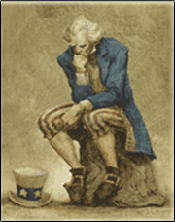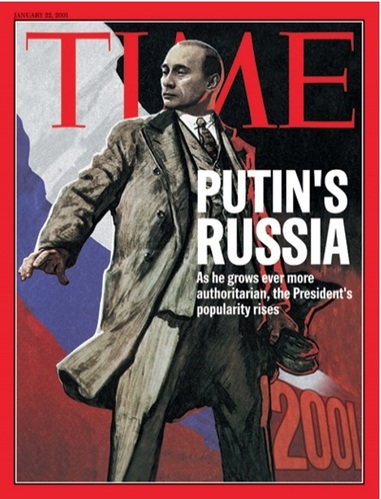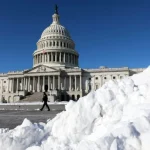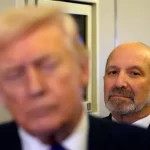
–>
October 21, 2022
Speaking in Poland in March 2022, President Biden declared, “For God’s sake, this man cannot remain in power.”
‘); googletag.cmd.push(function () { googletag.display(‘div-gpt-ad-1609268089992-0’); }); }
Despite the White House’s denial, it is widely understood that the US policy is a regime change in Moscow and, by extension, the promotion of Western democracy in Russia. However, those who wish that Vladimir Putin would go away and work to that end must be aware that the gods often punish men by fulfilling their wishes too completely.
The Western folly is that Westerners measure Putin per their values. But Russia is different; one cannot understand Putin without understanding the Russian national character, which derives from more than a thousand years of history and embraces different values and ideals than those of Western Europeans and Americans.
So, while we can concede that Vladimir Putin is not Thomas Jefferson and Russia does not pass muster with the National Endowment for Democracy, we should also acknowledge that from Peter the Great to Vladimir Putin, with the notable exceptions of Czar Nikolas II and President Boris Yeltsin, Russia has been ruled by ruthless autocrats. Considering this background, Putin may be the most moderate leader Russia has ever had.
‘); googletag.cmd.push(function () { googletag.display(‘div-gpt-ad-1609270365559-0’); }); }
Regrettably, if history is any guide, the moderates and democracy do not do well in Russia. Russian Czar Nikolas II, a moderate autocrat, was forced to abdicate after a series of defeats Russia suffered in the First World War ignited a Marxist revolutionary movement.
A few months later, in October of 1917, the democratically elected Provisional Government was overthrown by the grisly gang of Bolshevik terrorists who took power in Petrograd (now St. Petersburg) and proclaimed a revolutionary doctrine rejecting all established concepts of order. After a descent into a series of upheavals, civil war, famine, and Stalin’s “Great Terror” that took around forty million lives, the country defeated Nazi Germany and emerged as the powerful Soviet Union and the leader of the Warsaw Pact, threatening the world with nuclear annihilation.
In 1991 the communist colossal crumbled and democratically elected president Boris Yeltsin replaced the Marxist-Leninist government. The event was viewed as a triumph of democracy. But the jubilation proved to be premature. Russian democracy demonstrated pathetic frailty by allowing mobsters and heads of organized crime syndicates to get elected to the Duma – the Russian parliament, and shield themselves from law enforcement with parliamentary immunity. Oligarchs and organized crime de facto run the country. They looted the Soviet economy and plunged Russia into chaos and bankruptcy. Saint Valentine’s Day Massacres became a routine method of resolving business disputes. Order needed to be restored if the country was not to disintegrate.
So, in 2000 Yeltsin was forced to pass on the reins to the unremarkable former KGB officer Vladimir Putin. Yeltsin handed over a country in a state of despair. Calamitous economic depression, hyperinflation, lawlessness, and disintegrated arm forces — this was the period that many Russians now associate with “democracy.”
Someone called him the capo di capi, the boss of bosses, the Lucky Luciano of Russia. However, unlike Lucky Luciano, Putin jailed the bosses, deposed the oligarchy, restored order, and cleansed the country from all possibilities of opposition, political or otherwise.
In January 2001, Time Magazine wrote, “As Vladimir Putin becomes an increasingly authoritarian president, his popularity is growing.” “This suggests that we have a president who will radically change Russia and go down in history along with other great rulers of Russia.”

‘); googletag.cmd.push(function () { googletag.display(‘div-gpt-ad-1609268078422-0’); }); } if (publir_show_ads) { document.write(“
By 2020, the Russian economy had rebounded, and the armed forces regained strategic capabilities. Putin felt strong enough to confront what Moscow considered a severe threat to her security: NATO’s eastward expansion. As the rearmament and training of the Ukrainian army prefigured the potential acceptance of Ukraine into the NATO alliance, the level of anxiety in Moscow skyrocketed. The stage had been set for a conflict.
But then, Putin revealed his moderate side in the poor prosecution of the war, primarily because of the insufficient number of troops committed to the operation, his restraint on attacking Ukrainian infrastructure, his unwillingness to prevent an unmolested supply of Western materiel to the Ukrainian army, and his so-far unfulfilled threats to attack Western centers of decision-making. This perceived weakness has caused anger and dissatisfaction among some decision-making centers in Moscow. Putin ignored the KGB motto, “threats are the weapon of the weak against weaklings,” which tanked his credibility. Biden and the NATO allies are no longer afraid of him.
Moreover, after the failure to score a knockout blow and take Kiev, the war has entered a protracted phase, which is a bad development for Russia. Not least because the perception is that Ukraine wins if it doesn’t lose, while Russia loses if it does not win.
The perception, in this case, reflects reality because it is not the size, abundance of natural resources, or economic strength that made Russia a world power; it is foremost its military prowess. And to maintain this status, Moscow must be victorious in this war, whether with Putin or without him.
Hence, if the situation in Ukraine does not improve dramatically in Russia’s favor, Time’s 2020 prediction may not fully materialize – Putin may go down. Against this backdrop, we should not deceive ourselves about the mysterious Russian soul hoping that all the demons in the Russian political DNA have evaporated over the last hundred years.
Indeed, the history of Nikolas II can repeat itself. If the failure to prosecute the war successfully leads to regime change in Russia, it may not be in a direction to our liking.
Alexander G. Markovsky is a senior fellow at the London Center for Policy Research, a conservative think tank that examines national security, energy, risk analysis, and other public policy issues. He is the author of Anatomy of a Bolshevik and Liberal Bolshevism: America Did Not Defeat Communism, She Adopted It. Mr. Markovsky is the owner and CEO of Litwin Management Services, LLC. He can be reached at [email protected]
<!– if(page_width_onload <= 479) { document.write("
“); googletag.cmd.push(function() { googletag.display(‘div-gpt-ad-1345489840937-4’); }); } –> If you experience technical problems, please write to [email protected]
FOLLOW US ON
<!–
–>
<!– _qoptions={ qacct:”p-9bKF-NgTuSFM6″ }; ![]() –> <!—-> <!– var addthis_share = { email_template: “new_template” } –>
–> <!—-> <!– var addthis_share = { email_template: “new_template” } –>







